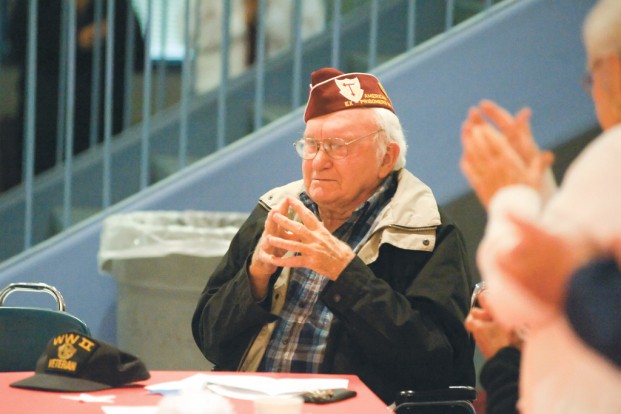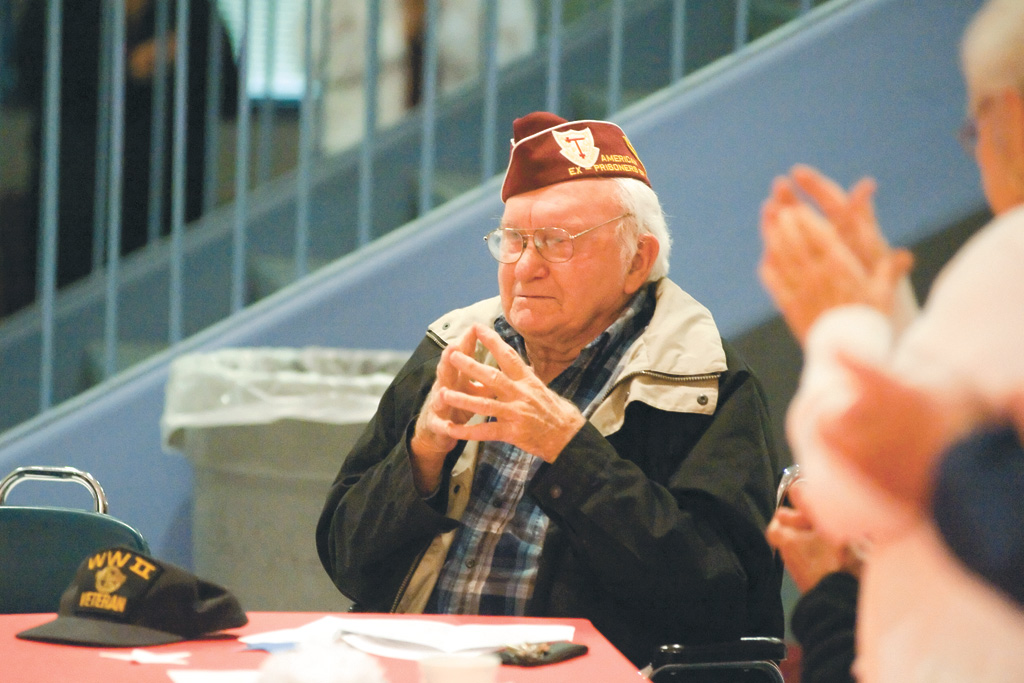

Jim Pruitt, who survived more than five months in a German POW camp, received two standing ovations at Tonasket’s Veterans Day assembly on Nov. 9.
Jim Pruitt, the area’s last known surviving World War II Prisoner of War, was honored at the Tonasket High School Veterans Day assembly and awarded a certificate recognizing his service to the country. Michael Stewart and Gazette-Tribune reporter Brent Baker interviewed Mr. Pruitt about his harrowing experience as a POW. Below are excerpts from that interview; the full interview will be included as part of the oral histories that are being collected at the U.S. Armed Forces Legacy Project.
Michael Stewart: When you were in the military, Jim, over in that crazy war, how much combat time did you see over there?
Jim Pruitt: Exactly one month. I was on the front lines exactly one month. October 21st to November 21st.
Brent Baker: Probably the longest month of your life.
MS: So did you get to jump (as a paratrooper) during the war?
JP: No. I didn’t make it in the troopers. They wouldn’t take me. I’d had a hernia. I don’t know how I got that hernia but because of that they wouldn’t let me jump. So I didn’t make it. I don’t know whatever happened to the guys I trained with… We didn’t know where we were going after we were in Italy. So I got assigned to the 143rd and went up through France through Marseille, through Dijon.
MS: What kind of gear did you have that time of year? Was it August?
JP: No, it was the latter part of September, first part of October.
MS: Did they have you guys pretty well winterized with gear?
JP: No. We didn’t have any winter gear. We just had our regular summer gear. We never had a sleeping bag. I wouldn’t have wanted one anyway.
MS: They’re mummy bags.
JP: Never could get out of the damn things. I carried four blankets. Most guys carried three.
MS: So did you guys have boots or shoes?
JP: We had combat boots.
MS: Good good, at least that much. What weapons were you carrying?
JP: M-1. That was a sweet shooting gun. That was a nice gun. I’ve thought for a long time if you go back to France you could probably find my rifle where I dropped it. Because, you see, I was in water. We were in water when we were captured. Trying to escape. And I just dropped that gun right in the water, so I’ll bet it stayed there.
MS: So was it a lake, a river?
JP: It was an irrigation ditch. There was nine of us in the squad. Five of them were in the cellar outside this house when the Germans came up and threw a potato masher in there and got them. Four of us were in the house, including the squad leader. Sergeant (Flores), a Mexican. We all had been in the cellar. Four of us left and went in the house. And then we heard the Germans outside. The sergeant said ‘Hey, they’re saying out there they want us to surrender,’ or words to that effect. He started to open the door and oh, hell, they didn’t want a surrender. They shot through the door and he ran upstairs. The other three of us went out the back window of the house, and he dropped from the second floor. The four of us ran.
One guy by the name of Rhett Brown went to the right. The other three of us went to the left. And there was this irrigation ditch where there was water, and Flores says get in there and climb up on the bank and shoot. It was so slick I couldn’t climb up on the bank, and couldn’t move very fast either. When I looked around there were several guns pointed at my back, so I very conveniently dropped my rifle.
MS: Command decision. I know that one pretty well. From there, when they captured you, how far did you have to walk?
JP: Not sure. They had a nice jail there but we didn’t stay there very long. And here I was wet — well three of us were wet. We had one guy, and he spoke German, too. He was real slow. Slow moving until it came time to run, and then he was the fastest guy there was. He was way out in front of Flores and me.
MS: Did he get captured too?
JP: Yeah.
MS: So how many from your squad were captured?
JP: Eight. They killed the one guy who went to the right. He drew all the fire. He saved us because they shot at him instead of at us.
MS: Do you think he might have known what he was doing?
JP: No. None of us knew what we were doing. I was really fortunate it was the Wehrmacht and not the SS that caught us. Just the regular German Army.
MS: (Referring to a piece Pruitt wrote for a remembrance book) That probably was an enlightening moment to wake up (after being transported at night while huddled in a train car) with a black guy next with you. Color don’t mean nothing, does it.
JP: That’s right.
MS: That’s one of the things we did learn in the military in tight situations. It don’t matter if you’re black, red, green, gay, what, can you fight? Will you back me? Then I’m with you… Luckily you only had to do a month and some odd days.
JP: Nope. Five months, 10 days, and eight hours.
MS: Ah, but who’s counting?
JP: Me.
BB: How did you keep track of it while you were there?
JP: I don’t know that we did know.
MS: So for that time you were locked up in Stalag 7A, what did you do every day? What time did they make you get up? Was it like in the movies?
JP: I was in 5A before I went to 7A. 5A was in Ludwigsburg. 7A was just out of Munich in Mossberg. They took work details out every day. We went into Munich. We rode the train into Munich day after day to clean up the debris or whatever they would have for us to do that day.
MS: What about 5A?
JP: In 5A that was when I was in the hospital for a month. I told you I was wet. I got pneumonia. And there was another fortunate incident. You ever hear of the Arnhem? Where the paratroopers dropped down into Belgium and the Germans wiped them out?
MS: Yep.
JP: One of those guys was a doctor, and he survived. And the Germans let him set up an infirmary and have a sick hall.
MS: I’ll be darned. In the Stalag.
JP: That was unusual. I went to sick hall and he saw I had a problem, so he put me in what they called a hospital. It was just a building with no heat, no food and no meds. So I lay in that hospital for a month with no meds. And I think that contributed to this (his health condition now). But at the same time it saved my life. Because I never have heard what happened to the other guys I was with. I think they went on a forced march. Did they survive? I don’t know.
MS: There were no complete records. Boy, you were a most fortunate man.
JP: I was really fortunate. I was really sick. There were two Arabs. One had a broken leg and the other had the sift. And they waited on me. They got me what little I got to eat, and when there was an air raid they got me to the cellar.
MS: In the hospital with you. Wow. Incredible. But you know that’s what the kids have to know about today is these stories because they just don’t have any concept of what our early soldiers went through to gain the freedoms we have, and even the right to say its (bull).
BB: I don’t think they have any concept of the kinds of losses there really were. They may see a number.
JP: The war was won by 18-year-olds.
MS: So from the Stalag, how did they turn you loose? Did they just one day open the gates and tell you to just get the hell out of here?
JP: I wasn’t in the Stalag. When the war ended I was living in a box car in the Munich railroad yard. They had so many people down there in 7A that they didn’t have enough room.
BB: So you were overflow.
JP: They came in from the northern part of Germany and drove everything south toward … Switzerland.
So they kept moving people down there. And they ran out of room. I don’t remember how many of us, a few hundred of us, in box cars. And parked us in the rail yard in Munich. So the troops got into Stalag 7A on April 29, but they got into Munich on April 30. The 42nd division came in here. One of the guys lived up here on the hill that was in that action. They just drove into town and all the guards took off the day before and just left. They gave us guys the pistols they had. I brought a pistol home.
MS: German?
JP: No, mine was Russian. There were Russians all over the place.
MS: In the box cars, what kind of heat? Did you have any heat?
JP: Heat? What’s that? It was April, so it wasn’t that cold. But during the winter they took us out on these work details, you see. And we had these big old Italian overcoats. And they all had pockets inside. And we’d fill those pockets with whatever we could steal — food or wood. So we had to pack the wood back for the stoves in the barracks or otherwise we’d have had no heat at all.
BB: How long were you in the boxcar?
JP: You know, I can’t remember that. Not very long, anyhow. And then after the guards took off we went into town and spent the night in a German house. The German people were glad to have us because they were afraid of what would happen to them. We spent the night, and I remember the quilts and whatnot were all feathers. Feather beds.
BB: that must have been glorious after however long it had been.
JP: Yep. Yep.
I really enjoy telling people about the one thing that happened to us. This day and age you have to get up and take a shower every morning. How the hell do you get dirty sleeping by yourself every night? But you got to get up and take a shower? I know damn well you don’t have to take a shower every day. I went three months without taking one. And here I sit. How about that?
MS: I bet after three months you were a little crusty.
JP: So what? I was alive. And the next time it was only two months. The rest of the story was, you could turn your sleeves back, and gosh, you had a white line around your wrist. And then you had a lot of little — oh! Those things were moving. But so what? You were alive. You were alive, that’s all that matters.
MS: What were they, worms? Lice?
JP: Lice. Everyone had lice.
MS: Sure, I bet you did. Hard to get away from it in those days. So what was your diet? What kind of food did you have while you were locked up?
JP: How would you like to have blood cheese?
MS: You know, that doesn’t sound real appetizing just even sitting here today. What is it?
JP: Especially if it has a mouse head in it.
MS: That’s real blood.
JP: Real food, ain’t it?
MS: I guess. It’s extra meat.
JP: Blood cheese. I could never eat that. Off and on during the war there came a Red Cross parcel. There was supposed to be one once a week for each man. But they didn’t have transportation. So once in awhile you’d get one. In that parcel were Chelsea cigarettes. Don’t you still smoke ’em?
MS: Noooo. No, in my day it was Pall Mall, Kools and Chesterfields, four to a box.
JP: Anyhow, these were trading material, these cigarettes. I never smoked one in my life, and still I’ve got COPD… These Russians always had a loaf of bread. You could trade cigarettes for a loaf of bread. And after you got used to eating that bread, it was all right. But until you got used to it, man oh man, it was hard on the digestive system. So we traded with the Russians. Cigarettes for that. Just whatever we could steal. Might steal a potato now and then. They’d bring kind of like these half-barrel flower pots that you see, about that sized, and it would be colored water and it looked like grass clippings in there with maybe one potato in the bottom. And that’s what we’d have to eat.
MS: Soup. Gruel. How much did you weigh before you went in there? What was your fighting weight?
JP: I weight about 145 I think. I wasn’t very heavy. But you get bloated. Before I got home I was so bloated. We came into Ford Dix, New Jersey and I’ve never seen as much food in my life. You could have just all of everything you wanted, and of course we all filled up and got so damn bloated. We didn’t have much food, just enough to subsist on. Got the Red Cross parcels, and that kept us going. I can’t remember what all was in one but was a nourishing package anyhow.
MS: Cigarettes for sure, and probably little biscuits.
JP: There was some meat in there, crackers. But when the 42nd came into Munich, and then this house we spent the night in they had a young girl who was about 13. We knew the troops were coming in and I took her with me and we went down on the corner. And just like all the GIs still do today, I yelled ‘Throw me a ration!’ and he did, and I took the chocolate bar out and gave it to her.
MS: Right on.
JP: She hadn’t had one in I don’t know how long. GIs have always done that. Always will.
Note: Mr. Pruitt is missing a book, “American Prisoners of War, Volume 1,” that he believes was borrowed at some point. If anyone has come across the book, it can be returned to Mr. Pruitt by dropping it off at the Armed Forces Legacy Project office.




